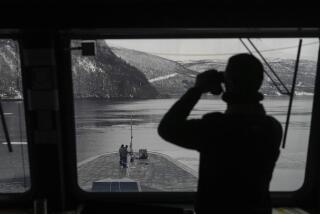Russia Makes NATO Blink
- Share via
NATO troops continue to spread out over Kosovo in an operation that is likely to see the disputed Serbian province remain an international protectorate for years to come. One place NATO troops haven’t been able to go is the airport at Pristina, the provincial capital, where the alliance had intended to locate its expeditionary force headquarters. Over the weekend Russia stole a march--literally--on NATO, rushing in a 200-man contingent that seized the field to enforce its demand for a major say in Kosovo’s future. An embarrassed Lt. Gen. Mike Jackson, the British commander of the peacekeeping forces, could only implausibly claim that he really didn’t care much about the airport anyway since it’s too far out of town to be a convenient headquarters.
The dash to Pristina was made by Russian troops serving as part of the peacekeeping forces in nearby Bosnia. NATO’s initial response was confusion at both the military and political levels. Russia’s official explanation for the action is that since the Kosovo occupation is a U.N.-sanctioned undertaking it has the right to participate without putting its troops under NATO’s orders. Russia is demanding its own zone of responsibility in northern Kosovo, where most of the province’s Serbs live, claiming that as its due because its diplomacy helped stop the war. The unofficial explanation for the airport coup came from a Russian general: “By sending its paratroopers to Yugoslavia . . . Russia has shown to everyone in the world that its army is still alive and we are not as helpless as some may think.”
President Clinton tried to minimize the significance of the Russian challenge by saying that local military commanders could deal with it. The quick and correct response from U.S. Gen. Wesley K. Clark, NATO’s commander, was that the problem is political and can be dealt with only at the political level. On Monday, the White House had to agree. Secretary of State Madeleine Albright and Defense Secretary William S. Cohen will meet soon with their Russian counterparts to try to end the impasse, and Clinton will talk with Russian President Boris N. Yeltsin in Cologne, Germany, over the weekend at the G-8 summit.
Moscow’s readiness to pull such an in-your-face stunt just days before that summit indicates how determined it remains to assert Russia’s claim to be a key player in European affairs. Russia goes to the G-8 meeting seeking billions of dollars in fresh aid from the International Monetary Fund to prop up its enfeebled economy. The United States and its allies could block that help, though at the risk of strengthening Russia’s anti-reform, anti-Western forces. The chances are, then, that the allies won’t try to use their economic leverage to dictate a settlement of the dispute over who does what in Kosovo.
Russia’s challenge to the West might well win it a bigger role in Kosovo than NATO was prepared to grant. That would assure Yugoslavia’s President Slobodan Milosevic an advocate among the occupying forces. That is not something NATO wanted. Worse, it is not something it had the vision to anticipate.
More to Read
Sign up for Essential California
The most important California stories and recommendations in your inbox every morning.
You may occasionally receive promotional content from the Los Angeles Times.










